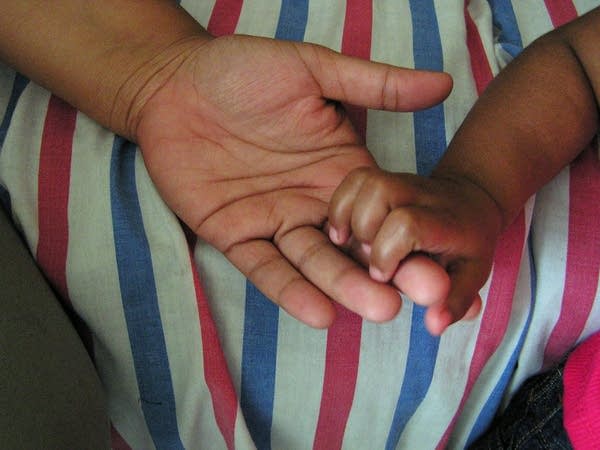For children born into poverty, brain development may be hindered
Go Deeper.
Create an account or log in to save stories.
Like this?
Thanks for liking this story! We have added it to a list of your favorite stories.

A condition experienced by children born into chaotic environments that can cause developmental brain problems is on the rise, brain researchers say.
When a child is born into poverty, the chaotic and often unstable environment can cause a damaging brain condition known as toxic stress.
Megan Gunnar, a professor of child development at the University of Minnesota, said toxic stress chemicals in the brain increase when families live without housing, food or stability, or where there is physical or emotional abuse.
"The reason the stress chemicals don't come back down is the adults who help children regulate stress are not there or present, or they are themselves dysfunctional because they are experiencing toxic stress in their lives," Gunnar said.
Turn Up Your Support
MPR News helps you turn down the noise and build shared understanding. Turn up your support for this public resource and keep trusted journalism accessible to all.
Gunnar said toxic stress chemicals slow the creation of the architecture in babies' brains.
If we could peek inside, she said, we would see the damage to the brain tissue.
"You begin to kill neurons; you begin to damage the connective processes between them; you begin to damage the white matter of the brain," she said.
As babies become toddlers and adolescents, toxic stress can lead to affected children not getting along well with other kids.
Gunnar said fixing brains harmed by toxic stress may be possible but can take a lot of time.

"If the initial wiring is poorly done, then it's very difficult to come back and build a solid structure on top of a shaky foundation," she said.
It is unclear how many babies and children in Minnesota risk poor brain development because of toxic stress, but advocates point to the number of babies born into poverty as one indicator.
According to Minnesota Department of Health statistics, more than one-third of the babies born in Minnesota each year for the past few years have entered been born into welfare or MinnesotaCare, meanings they were born into poverty or to low-income families.
The number of poor children in Minnesota has grown 23 percent in 10 years, according to figures from Kids Count.
The increase counts children only up to 2008, and advocates expect the number to be higher when the effects of the recession are factored in.
Another piece of evidence showing the level of poverty is the demand on services like Head Start.
Head Start, the preschool program for children from low-income and poor families, does not have enough space for all of the children who qualify, said Richard Chase, a researcher at the St. Paul-based Wilder Foundation.
"About two or three years ago, we were able to cover 75 percent of the kids available for Head Start, but now we can cover less than half even though we've added slots," Chase said. "We can't keep up with the growth of the poor kids."
The arrival of the recession two years ago caused Amelia, 32, of New Brighton, to plummet into poverty. MPR News is not using her last name.
"Had my daughter, tried to finish school, laid off work, Mom lost the house, had to find somewhere to live; it was like everything all at once," she said.
Added to the stress of losing her job and housing, Amelia's daughter was born premature, but, 22 months later, her toddler appears to be fine.
Amelia and her daughter had the support of a public health nurse from the Minnesota Visiting Nurse Agency, a nonprofit which supplies maternal and child services for Hennepin County.
Amelia also said she made a conscious effort to hide her emotions in an effort to shield her baby from the toxic stress of losing a home.
Getting out of poverty is fraught with challenges -- just as Amelia found temporary employment, she fell ill and a hospital stay and time away from work caused her employer to fire her.
"That day I cried all day long. All day long.... I don't know what I'm going to do," she said. "And then I get that phone call and it was like a huge weight lifted off my shoulders."
The phone call was from a former employer, asking Amelia back to work.
It's a good development for Amelia, and the regained slice of stability is perhaps the best prevention against toxic stress.



